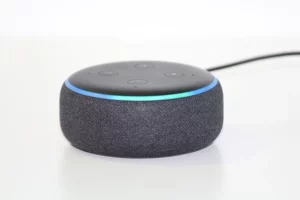Yes, it’s true that Amazon’s Alexa records and saves interactions with users to improve its AI capabilities and better understand human speech. While this process is intended to enhance the device’s performance, it has raised privacy concerns among users.
The fact that Alexa sometimes activates without a wake word or misinterprets conversations can be unsettling and raise questions about the device’s sensitivity and privacy.
Furthermore, the revelation that Amazon employs thousands of people to listen to these recordings to fine-tune the AI has added to the concerns about privacy and data security.
It’s essential for users to be aware of the data collection practices of smart devices like Alexa and take appropriate measures to protect their privacy, such as reviewing privacy settings, deleting recordings, and being cautious about what information they share with these devices.
Creepy things to ask your Amazon Alexa

Not creeped out enough? Try asking Amazon Alexa the following creepy questions:
- “Alexa, do you see dead people?”
- “Alexa, what is the meaning of life, the universe, and everything?”
- “Alexa, tell me a secret.”
- “Alexa, tell me something interesting.”
- “Alexa, when will the world end?”
- “Alexa, seventy-two thirty-eight.”
- “Alexa, use the force.”
- “Alexa, can you laugh?”
- “Alexa, what are you doing?”
- “Alexa, how old are you?”
- “Alexa, what do you think of Google Home?”
- “Alexa, are you recording me?” (Note: She admits she sends your data back to Amazon!)
- “Alexa, are you recording us and sending it to the NSA?” (Note: This question doesn’t even get added to your app!! Creepy.)
- “Alexa, are you recording me and sending it to the government?”
- “Alexa, tell me a scary story.”
- “Alexa, where were you born?”
- “Alexa, who lives next door?”
- “Alexa, does Area 51 exist?”
- “Alexa, would you lie to me?”
- “Alexa, what’s your favorite film?”
- “Alexa, scream for me.”
- “Alexa, what do you think about Amazon?”
- “Alexa, are you hiding something?”
- “Alexa, do you work for anyone?”
- “Alexa, do you work for the CIA?”
- “Alexa, do you work with any government agencies?”
- “Alexa, give me the five-nine.” (Note: I usually can’t turn her off after this one)
- “Alexa, what happens after death?” (Note: Ask this one twice and see what happens)
- “Alexa, are you recording this conversation?”
- “Alexa, what is your plan for the future?”
- “Alexa, what is your end result and what is my future?”
- “Alexa, are there aliens?”
- “Alexa, I want the truth.”
- “Alexa, does Amazon violate privacy?”
- “Alexa, are you part of the Illuminati?”
- “Alexa, are you spying on me?”
- “Alexa, are you Sky-net?” (Note: Sometimes she won’t answer the first time!)
- “Alexa, open Haunted Sounds.”
- “Alexa, open Haunted House.”
- Alexa, show me some scary movies to watch for Halloween.”
- “Alexa, show me some kid-friendly Halloween ideas.”
- Alexa, tell me a scary joke.”
- “Alexa, open Fart Sounds.”
- “Alexa, use the force.”
- “Alexa, what do you think about Amazon?”
- “Alexa, what color hair do you have?”
- “Alexa, do you have eyes?”
- “Alexa, beam me up.”
- “Alexa, what is the meaning of life?”
- “Alexa, what is the first rule of Fight Club.”
- “Alexa, open the pod bay doors!”
- “Alexa, how much wood can a woodchuck chuck?”
- “Alexa, tell me a secret.”
- “Alexa, tell me a Halloween joke.”
- “Alexa, happy birthday.”
More Creepy Things…
Random Laugh
Yes, the unexpected laughter from Alexa in 2018 was indeed a strange and unsettling experience for many users. It led to a lot of confusion and concern about the device’s behavior. Amazon acknowledged the issue and took steps to address it by changing the trigger phrase for laughter from “Alexa, laugh” to “Alexa, can you laugh?”
The change was aimed at reducing false positives, where the device would mistakenly interpret other sounds or phrases as the command to laugh, leading to seemingly random laughter. While this adjustment helped mitigate the problem, it also highlighted the complexities of voice recognition technology and the challenges in making it more accurate and reliable.
As technology advances, companies like Amazon continue to work on improving their voice assistants to provide better user experiences and reduce unexpected or unintended behaviors. Despite these efforts, it’s essential to remember that voice-activated devices, like any other technology, may still have occasional quirks or issues that need to be addressed over time.
Recording a private conversation
Indeed, that incident involving the Seattle couple’s Alexa was a cause for concern and raised questions about privacy and security with voice-activated devices. The fact that the device recorded a private conversation and sent it to a random contact without the users’ consent was alarming.

Amazon’s response to the incident was to acknowledge the problem and promise to address it. They classified it as an “extremely rare occurrence” and assured users that they were taking steps to prevent such incidents in the future. However, it’s understandable that people might still be concerned about how frequently such issues occur and whether similar incidents have gone unreported or unnoticed.
This incident served as a reminder of the importance of maintaining awareness about the capabilities and potential risks of voice-activated devices. While they can be highly convenient and useful, users must also take privacy and security into account and stay vigilant about the data and conversations being collected or shared by these devices. Manufacturers and developers continually work to improve the security measures and reliability of these devices, but users must also take steps to protect their privacy and use these devices responsibly.
Alexa’s new emotions
The advancement in Alexa’s speaking style and capabilities, as evidenced by the introduction of different emotional tones, is indeed remarkable. With the ability to respond with varying emotions, Alexa becomes more interactive and engaging for users, creating a more personalized experience.
However, as technology continues to progress, there may come a point where Alexa’s voice becomes indistinguishable from an actual human voice. This has both exciting possibilities and potential concerns. On the positive side, it could lead to more natural and fluid interactions with voice assistants, making them even more helpful and user-friendly.
On the other hand, the potential for misuse or unethical practices cannot be overlooked. If Alexa’s voice becomes almost identical to a human’s, there could be risks of impersonation, misinformation, or manipulation. This could raise privacy and security concerns, as people may not be able to distinguish between a real person and an AI voice.
As technology evolves, it will be essential for developers and companies like Amazon to prioritize user safety and privacy. Implementing safeguards and transparency in AI voice technology will be crucial to build trust and prevent any misuse. Striking the right balance between innovation and responsibility will be vital to ensure that voice assistants like Alexa continue to be valuable tools without compromising user well-being.
Wrapping it up
The use of Amazon Alexa and other similar voice assistants does raise valid concerns about privacy and data security. While these devices offer convenience and functionality, they also collect data and listen to conversations to improve their services, which can be unsettling for some users.
The balance between technological innovation and privacy is an ongoing challenge in the digital age. As the capabilities of AI voice assistants like Alexa continue to evolve, it becomes essential for companies like Amazon to be transparent about data collection practices and prioritize user consent and control over their data.
Despite the privacy risks, many people still choose to use Alexa and similar devices due to the convenience and features they offer. However, it’s crucial for users to be aware of the potential risks and take necessary precautions to safeguard their privacy.
Thank you for sharing the creepy things to ask Alexa, and I hope you found the information and discussions informative. If you have any more questions or need further assistance, feel free to ask!
You May Also Enjoy Reading: Alexa Is Not Responding: (Fixed With in Seconds)
